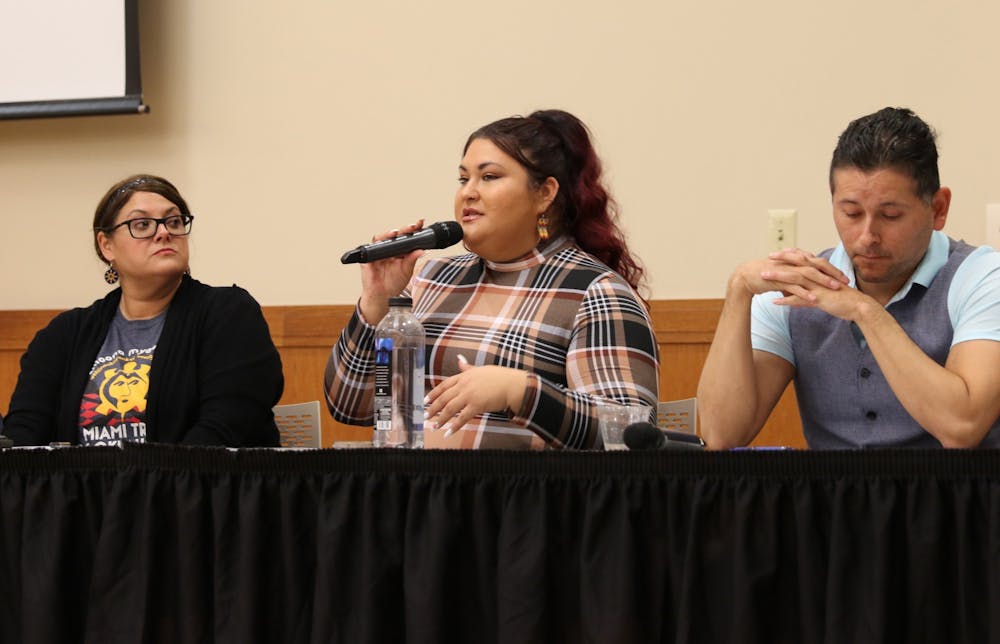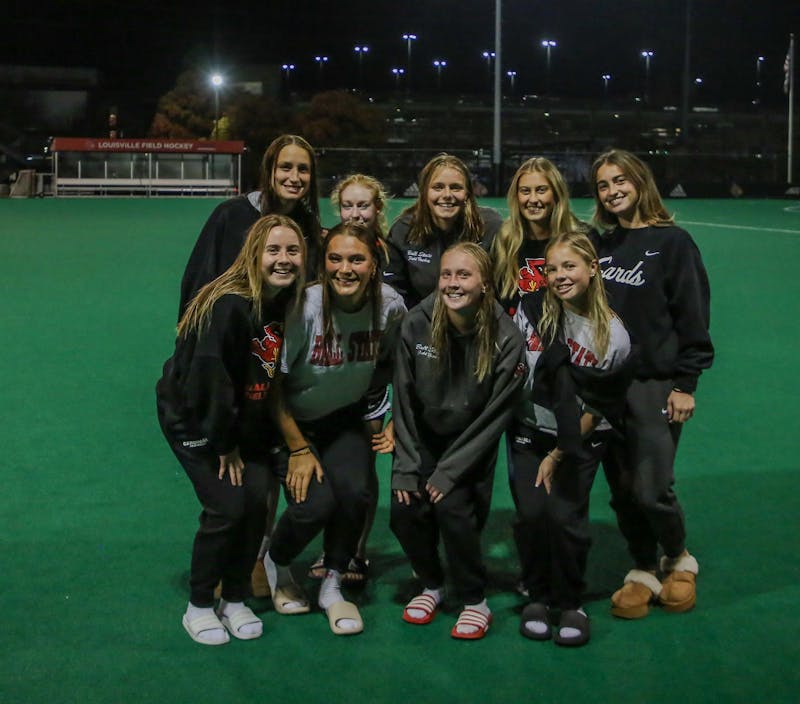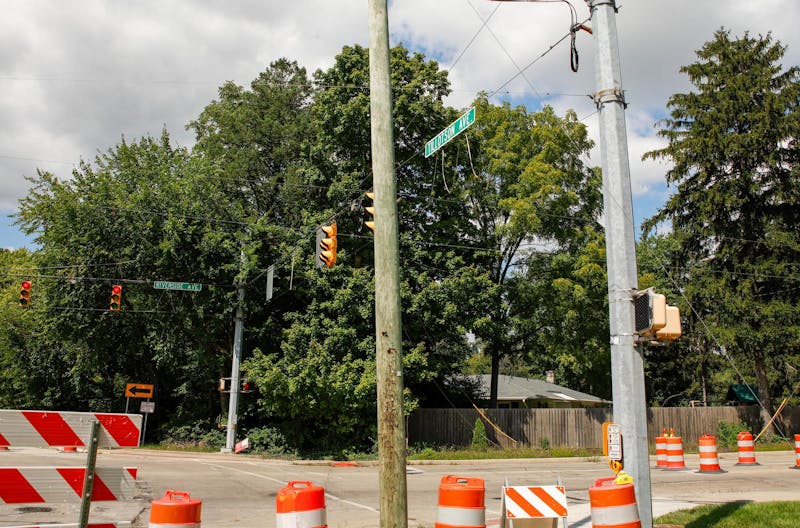Tuesday at 7 p.m., the Ball State University Honors Inclusive Excellence Series, with the help of the Student Antiracism and Intersectionality Advisory Council, sponsored a panel for Native American Heritage Month.
The event, held in the L.A. Pittenger Student Center, drew a large audience. Eight rows of 14 chairs were filled with Ball State students and faculty, as well as Muncie community members.
Emily Rutter, associate dean of the Honors College and associate professor of English, helped organize the event. Rutter opened the event, introducing Muncie Deputy Mayor Richard Ivy.
Ivy read a proclamation, signed by Muncie Mayor Dan Ridenour, encouraging Muncie and Delaware County residents to learn and understand the indigenous history in the county, as well as acknowledging “the Leni Lenape and Myaamia people that still call the City of Muncie and Delaware County home.”
After Rutter’s introduction and Ivy’s reading, the event transitioned to the panel and discussion section.
Three members of three different tribes spoke on the panel: Molly McGuire of the Miami Tribe of Oklahoma, Carolina Castoreno of the Lipan Apache Tribe of Texas and Larkin Fourkiller of the Eastern Band of Cherokee Indians.
Obed Frausto Gatica, assistant teaching professor of the Honors College, along with students from the Honors College Diversity Project, asked prepared questions to the three speakers.
McGuire, a Muncie-native and Ball State alumna, gave a brief history of Muncie and Delaware County’s indigenous people and their role in Muncie’s early settlement.
She spoke on how Muncie’s name came from the dialect of the Delaware Tribe: Muncie or Munsee. The Delaware Tribe lived in the Minnetrista area during early settlement.
“The city being named after a chief by the name of Munsee is fake news, a tall tale, a farce, a folklore [or] whatever you want to call it,” McGuire said. “There was never a Lenape chief by the name of Munsee, and the statue at Walnut [Street] is not ‘Chief Munsee.’”
McGuire said the statute’s name is the “Appeal to the Great Spirit.”
“The problem with the ‘Chief Munsee’ untruth is that it undermines an accurate understanding of the indigenous origins of our community, and it serves as an example of how there is a blatant disregard to our part of history,” McGuire said.
McGuire brought up many important figureheads in Delaware County’s history, such as Chief William Anderson of the Unalachtigo Lenape, and Goldsmith Gilbert and Rebecca Hackley of the Miami Tribe.
Castoreno, a Mescalero Apache descendent and the executive director of the American Indian Center for Indiana, spoke on decolonization and how there’s multiple concepts of indigenouity: global, racial and political. She described herself as a “militant Indian.”
“I'm very pro-decolonization,” Castereno said. “I am very much take up as much space and make colonizers uncomfortable as much as possible, type of person.”
Fourkiller, an independent artist, spoke on how the indigenous people were all over the United States but now only represent approximately two percent of the population and the loss of culture.
“We were all over the United States and Canada and now we represent two percent of the US population,” Fourkiller said. “I mean that should be realized right away. I mean, that's, that's not even a problem. That's a catastrophe.”
Fourkiller talked about how many indigenous people don’t know their native language due to the mass genocide and then being forced in boarding schools, where indigenous children were forced to lose their culture.
Castereno described this loss of culture as a “cultural genocide”, and how speaking and learning any words from one’s native language is defying colonizers. Castereno spoke about her grandfather, who was beaten and forced to cut his hair because of his indigenous culture. She said her grandfather was “militant” like her.
McGuire talked about how learning and relearning one’s culture sometimes felt like a losing battle. She brought coloring books, which serve as a way to teach the Miami language, to hand out.
McGuire, along with the other two panelists, also said the current education about Indigenous people is lacking, specifically fourth-grade history. Children are taught in a way where it seems like Indigenous people are no longer in Indiana. McGuire spoke on the importance of people knowing Indigenous people “are still here.”
The panel discussed many topics, such as blood quantum versus lineage, tradition, representation, addiction in Indigenous populations and laws that affect Indigenous people, among others.
Third-year Ball State student Skai Méndez, a Honors College Diversity Project fellow, spoke on the importance of this event, and why it needed to happen.
“It's really important that we don't just proclaim its indigenous heritage month we do something about indigenous heritage,” Méndez said. “So it's a lot about actions speak louder than words.”
This was the second year the Honors Inclusive Excellence Program put on this panel. Last year, McGuire was invited with her daughters and mother speaking.
When she was invited back, McGuire asked for other tribes to be represented.
“I wanted to ensure that we invited other folks from other tribes to ensure that they can get different perspectives.” McGuire said. “Again, mine’s only one perspective, and you can't really get a clear understanding of how different we are if you’re only hearing that from one person.”
This panel was a part of the Honors Inclusive Excellence Program, who are putting on events focused on inclusivity and diversity the whole academic year. They have an event Nov. 8 about first-generation students and their experiences.
Contact Hannah Amos with comments at hannah.amos@bsu.edu or on Twitter @Hannah_Amos_394.





The Daily News welcomes thoughtful discussion on all of our stories, but please keep comments civil and on-topic. Read our full guidelines here.